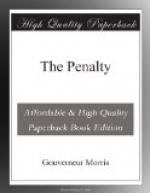“It seems,” said Dr. Ferris, “that I have made two terrible mistakes. And the second is having told you about the first. My God, but this life is hard to bear!”
“But—why—what have I said? If there is anything we can do for him, we ought to do it.”
“Are you going to say that to him?”
“Of course,” she said.
“Suppose,” said her father, “that in all this world he wanted only one thing—you?”
This suggestion was most unexpected to Barbara and odious. And she said coldly: “I hope he is not quite such a fool.”
“But if he is?”
“My dear father,” said Barbara, “I have been told that somewhere along the Milky Way there is a bridge between stars. Let’s cross that when we come to it.”
A footman entered carrying a large pasteboard box on which, in gilt letters, was the name of a Third Avenue florist. But the jonquils in the box were very fresh and lovely. They were, however, unaccompanied by a card.
[Illustration: “Some unknown person,” said Barbara, “has formed the habit of sending me flowers”]
“Some unknown person,” said Barbara, “has formed the habit of sending me flowers.” She smiled. “I shall ask my friend, Mr. Harry West,” she said, “to find out who it is.”
And then, suddenly, she turned away, so that her father should not see that she was blushing. The thought, not in the least disagreeable, had occurred to her for the first time, that perhaps Mr. Harry West himself was anonymously going down into his pocket for her sweet sake.
XVI
The legless man was not in the habit of waiting for things that he wanted, when the chance to take them had come. And he did not propose to endure the torture of sitting perfectly still hour after hour, morning after morning, while any young woman made a bust of him. Yet he allowed a number of mornings to pass without taking any definite steps toward the vengeance which he felt to be so dear to him.
That Barbara was a high-born lady was the chief obstacle in his plans. If she were to disappear suddenly out of the world which knew and loved her, there would be raised a hue and outcry greater, perhaps, than his utmost powers and resources could check. He would be run to earth without much doubt and put where even the sweet memory of vengeance would taste bitter in his mouth. It is perhaps pleasant to pluck the fruits of vengeance, but a man requires time in which to eat and digest them. If they are snatched from his hand the moment they are picked, his vengeance fails of all sweetness and justification.
On the other hand, Blizzard, in order to revenge himself on the man who had maimed him, was willing to give, if not his liberty, his life.
If he could not abduct Barbara and go free, he would kill himself when they came to take him. But he did not wish to kill himself. He wished to live a long time after, gloating on his memories. He had also on foot a scheme which, starting almost as a pleasantry, had developed in his mind, and was still developing, until its latent possibilities staggered his own imagination.




